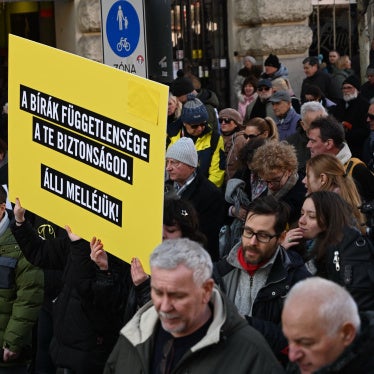OCTOBER 5, 1995 - RAID AT BELLONA MURMANSK OFFICE
The FSB unexpectedly raids the office of the Bellona Foundation (a Norwegian environmental group) in Murmansk. The FSB questions more than sixty people about Bellona's work on a report on the dangers of nuclear contamination caused by the Russian Northern Fleet. Prior to the raid, the Bellona Foundation had been operating openly in Murmansk.
FEBRUARY 6, 1996 - NIKITIN'S ARREST
The FSB arrests Alexander Nikitin in St. Petersburg and charges him with treason in the form of espionage (article 64 of the criminal code).
MARCH 27, 1996 - CONSTITUTIONAL COURT GRANTS NIKITIN LAWYER
The Constitutional Court rules that Nikitin must have access to a lawyer of his choice. The FSB had insisted that Nikitin's lawyer, Yury Schmidt, receive FSB security clearance.
SEPTEMBER 1996 - COUNCIL OF EUROPE APPOINTS RAPPORTEUR
The Council of Europe appoints Dutch Senator Erik Jurgens as rapporteur on the Nikitin case. He is instructed to investigate the case and report on his findings to the Council.
OCTOBER 18, 1996 - BELLONA REPORTS CONFISCATED
Customs officials confiscate more than 1,500 copies of the Bellona report, The Russian Northern Fleet: Sources of Radioactive Contamination, at the St. Petersburg airport, claiming it had been banned from distribution in Russia. At the same time, Bellona employees are banned from travelling to St. Petersburg, and eventually denied Russian visas.
DECEMBER 14, 1996 - NIKITIN RELEASED FROM FSB DETENTION
Following an intervention by the Procurator General's office in Moscow, Nikitin is released from pretrial detention. The case is returned to the FSB for further investigation.
JANUARY 27, 1997 - PROCURATOR: NO SECRET LEGISLATION
Deputy Procurator General Mikhail Katyshev orders the FSB not to use secret legislation as the basis for the indictment. The FSB ignores the order.
MARCH 2, 1997 - COUNCIL OF EUROPE REPORT
Council of Europe Special Rapporteur Jurgens reports in Strasbourg about the Nikitin case. He expresses concern about the use of secret decrees, flawed expert assessments and slanted reporting in the media.
AUTUMN 1997 - INVESTIGATION TEAM RESHUFFLED
Chief investigator for the Nikitin case suddenly dies of unknown causes. His predecessor, Boris Utkin, had been dismissed. In 1996, the FSB removed Utkin's predecessor from the case and fired him.
MAY 1998 - NIKITIN AND LAWYER HARASSED
Unknown men believed to be linked to the FSB follow Nikitin around St. Petersburg for several days and slash his tires three times. The same men tell Ivan Pavlov, one of Nikitin's lawyers, to "stay away from this case." The FSB denies any involvement.
MAY 8, 1998 - FINAL INDICTMENT
The FSB delivers its seventh and final indictment. It no longer contains references to specific points of the secret decrees but the decrees still form the basis for the charges. For a legal explanation of this indictment, see Human Rights Watch's letter of June 1, 1998 on our website: http://www.hrw.org.
SEPTEMBER 24, 1998 - FAIR TRIAL CONCERNS - LAY ASSESSORS
Council of Europe Special Rapporteur Jurgens expresses concern that Nikitin's chances for a fair trial are jeopardized, as the case will be heard by one professional judge and two lay assessors who have to receive security clearance from the FSB. Human Rights Watch expressed concern about this problem in a September 21 letter. See our website: http://www.hrw.org.
SEPTEMBER 29, 1998 - JUDGE ORDERS TO SEE SECRET DECREES
Judge Golets orders the Ministry of Defense to provide copies of the secret decrees under which Nikitin has been charged. The decrees will be delivered to the judge only on October 20. Nikitin and his lawyers do not know the contents of the decrees.
OCTOBER 20, 1998 - THE TRIAL BEGINS
Judge Golets opens the hearings at the St. Petersburg City Court at 10:30 a.m. at Naberezhnaya reki Fontanka 16.







